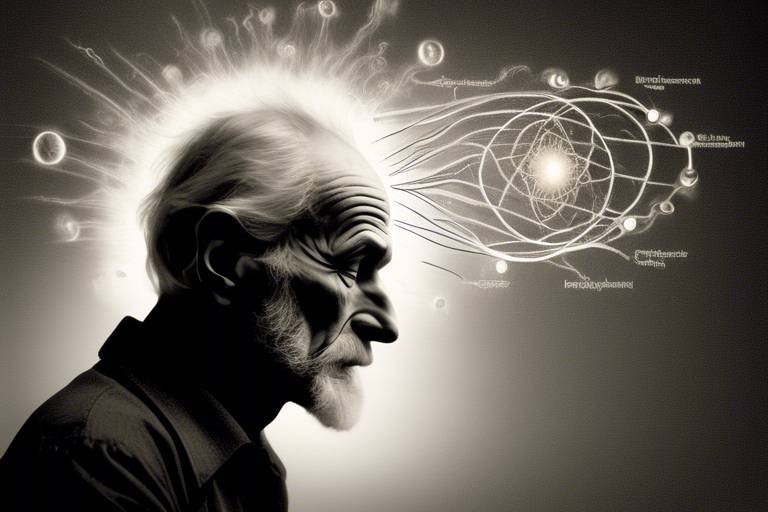The Role of Philosophy in Understanding Mental Health Sciences
In the intricate tapestry of mental health sciences, philosophy weaves a vital thread that enriches our understanding of the human psyche. By exploring the philosophical frameworks that underpin our perceptions of mental health, we can gain profound insights into the complexities of mental disorders, treatment modalities, and the ethical dimensions that govern mental health care. Have you ever wondered how concepts like consciousness and well-being shape our approach to mental health? This article delves deep into the intersection of philosophy and mental health, illuminating how these two disciplines can enhance our comprehension of mental health issues and the treatment approaches we employ.
To grasp the essence of mental health, we must first explore the philosophical foundations that shape our understanding. At the heart of this inquiry lies the concept of the mind, a topic that has intrigued philosophers for centuries. Questions about the nature of consciousness, the relationship between the mind and body, and what it truly means to be well are all pivotal in shaping our approach to mental health. For instance, dualism posits that the mind and body are distinct entities, while physicalism argues that everything about the mind can be explained through physical processes. These differing perspectives not only influence how we view mental disorders but also how we approach treatment and recovery.
When it comes to mental health treatment, ethical considerations are paramount. The principles of patient autonomy, informed consent, and the moral responsibilities of mental health professionals are all deeply rooted in philosophical thought. How do we ensure that patients have the right to make informed choices about their treatment? What happens when a patient's autonomy conflicts with the need for intervention? These questions are not merely academic; they have real-world implications for how we deliver care.
Informed consent is a cornerstone of ethical mental health practice. It involves ensuring that patients fully understand their treatment options and the potential risks and benefits associated with them. Philosophically, this process is guided by the principles of respect for persons and the promotion of autonomy. When therapists engage in open dialogue with their clients, they not only empower them but also foster a therapeutic alliance built on trust. Imagine walking into a therapy session feeling fully informed and respected; that’s the kind of environment that informed consent aims to create.
The tension between respecting patient autonomy and the potential need for paternalistic interventions is a delicate balancing act in mental health care. Sometimes, mental health professionals may feel compelled to intervene for a patient’s own good, especially when the patient is unable to make sound decisions due to their condition. This raises the question: where do we draw the line? The philosophical debate surrounding this issue challenges us to consider the implications of our actions and how they align with the ethical principles of beneficence and non-maleficence.
Cultural beliefs and values play a significant role in shaping ethical considerations in mental health treatment. Different cultures have varying perspectives on mental illness, which can influence how individuals perceive their own mental health and the treatment they seek. For example, in some cultures, mental illness may carry a stigma that prevents individuals from seeking help. Philosophically, this raises questions about the universality of ethical principles in mental health care and how we can navigate cultural differences to provide effective and respectful treatment.
The philosophy of mind offers valuable insights into the nature of mental health and illness. By examining theories such as dualism, physicalism, and functionalism, we can better understand the complexities of mental disorders. For instance, if we view mental health through a dualistic lens, we might prioritize psychological interventions, whereas a physicalist approach could lead us to focus more on biological factors. This interplay between philosophical theories and mental health highlights the importance of a multidisciplinary approach to treatment.
Existential philosophy profoundly impacts our understanding of mental health, particularly concerning anxiety, depression, and the search for meaning in life. Existential therapists emphasize the importance of confronting life's inherent challenges and uncertainties. They encourage individuals to explore their existence, grapple with their fears, and ultimately find their own path to authenticity. This approach recognizes that suffering is an integral part of the human experience and that through this suffering, individuals can discover deeper meaning.
Existential therapy is rooted in the belief that individuals must confront their own existence and the choices they make. It invites clients to explore their thoughts and feelings about life, death, freedom, and responsibility. By engaging in this introspective journey, individuals can find clarity and purpose, which can be incredibly therapeutic. Imagine sitting in a therapy session where you’re encouraged to explore your deepest fears and desires; this is the essence of existential therapy.
Meaning-making is a crucial aspect of mental health recovery. Philosophical insights can facilitate this process by helping individuals understand their experiences and find significance in their struggles. When people are able to construct meaning from their challenges, they often experience a sense of empowerment and resilience. In this way, philosophy not only enhances our understanding of mental health but also provides practical tools for recovery.
Finally, examining different philosophical perspectives on mental illness reveals the complexities of labeling individuals with mental health disorders. The medical model, which views mental illness as a disease, contrasts sharply with the social model, which emphasizes the role of societal factors in shaping mental health. These differing viewpoints influence how we approach treatment and the language we use to discuss mental health. By understanding these philosophical frameworks, we can foster a more compassionate and nuanced approach to mental health care.
- What is the role of philosophy in mental health? Philosophy provides a framework for understanding the complexities of mental health, including ethical considerations, treatment approaches, and the nature of mental disorders.
- How does informed consent relate to mental health treatment? Informed consent ensures that patients understand their treatment options and can make autonomous decisions about their care.
- What is existential therapy? Existential therapy focuses on helping individuals confront life's challenges and find meaning in their experiences, particularly in relation to suffering.
- How do cultural beliefs influence mental health care? Cultural beliefs can shape perceptions of mental illness and influence treatment approaches, highlighting the importance of cultural competence in mental health care.

Philosophical Foundations of Mental Health
When we dive into the realm of mental health, we quickly realize that it isn’t just about the brain's chemistry or the latest therapeutic techniques; it’s also deeply rooted in the philosophical foundations that shape our understanding of what it means to be human. Philosophy provides us with the tools to explore complex concepts such as mind, consciousness, and the nature of well-being. These concepts are not merely academic; they influence how we perceive mental health disorders and how we approach treatment.
At the heart of this exploration is the question: What is the mind? Philosophers have debated this for centuries, and their insights can illuminate our understanding of mental health. For instance, the dualist perspective, famously advocated by René Descartes, posits that the mind and body are distinct entities. This view raises important questions about how we treat mental health issues—can we truly address a mental disorder without considering the physical body? On the flip side, physicalism argues that everything about the mind can be explained through physical processes. This perspective suggests that mental health treatments should focus on biological interventions, such as medication.
Furthermore, we must consider the implications of functionalism, which posits that mental states are defined by their functional roles rather than their internal composition. This view opens up a broader understanding of mental health, allowing for a more inclusive approach that recognizes the diverse ways individuals experience mental health issues. It emphasizes that our understanding of mental health should not be limited to traditional diagnoses but should also include the subjective experiences of individuals.
The concept of well-being is another critical area where philosophy intersects with mental health. Philosophers like Aristotle have argued that well-being is tied to the fulfillment of one's potential and living a life of virtue. This perspective encourages a holistic approach to mental health, where treatment is not just about alleviating symptoms but also about helping individuals achieve a fulfilling life. In this context, mental health professionals can play a vital role in guiding individuals towards their own definitions of well-being.
Moreover, the philosophical exploration of mental health also leads us to consider the importance of context. Our understanding of mental health is not formed in a vacuum; rather, it is shaped by cultural, social, and historical factors. For example, in some cultures, mental illness may be viewed through a spiritual lens, while in others, it may be seen strictly as a medical issue. This diversity in understanding calls for mental health professionals to be culturally competent and aware of the philosophical underpinnings that influence their clients’ perceptions of mental health.
In summary, the philosophical foundations of mental health provide a rich tapestry of ideas that can enhance our understanding of mental health issues. By considering the nature of the mind, the definition of well-being, and the influence of cultural context, we can develop a more nuanced and effective approach to mental health treatment. Philosophy not only enriches our understanding but also challenges us to think critically about how we define and address mental health in our society.

The Ethics of Mental Health Treatment
When we dive into the realm of mental health treatment, we quickly realize that it’s not just about symptoms and diagnoses; it’s also deeply intertwined with ethical considerations. The ethical landscape of mental health care is complex and multifaceted, raising questions about patient autonomy, informed consent, and the moral responsibilities that mental health professionals bear. These ethical dimensions are not merely academic; they significantly affect the quality of care and the therapeutic relationship between clinicians and patients.
One of the cornerstones of ethical mental health treatment is the concept of informed consent. This principle ensures that patients are fully aware of their treatment options and the potential risks and benefits associated with them. Imagine walking into a therapy session without a clear understanding of what’s in store for you. It would feel like stepping into a dark room, wouldn’t it? Philosophical principles guide this process, emphasizing the importance of transparency and respect for the patient's right to make informed choices about their own mental health journey.
Informed consent is not just a formality; it’s a fundamental ethical obligation. It requires that clinicians provide information in a way that is comprehensible to the patient. This involves breaking down complex psychological jargon into everyday language. Think of it as translating a foreign language into something familiar. Patients should feel empowered to ask questions and voice concerns. When they understand their treatment options, they are more likely to engage actively in their healing process, fostering a sense of ownership over their mental health.
However, the ethical landscape isn’t always straightforward. There exists a tension between respecting patient autonomy and the potential need for paternalistic interventions. In some cases, mental health professionals might feel compelled to intervene in ways that could override a patient’s choices, especially if they believe that the patient is at risk of harming themselves or others. This raises a critical question: How do we balance the need to protect individuals with the respect for their autonomy? It’s a philosophical dilemma that doesn’t have easy answers, and it underscores the importance of dialogue between patients and practitioners.
Adding another layer of complexity is the influence of cultural beliefs and values on ethical considerations in mental health treatment. Different cultures have varying perspectives on mental illness, treatment methods, and the role of the therapist. For instance, in some cultures, mental health issues might be viewed through a spiritual lens, while in others, they may be strictly medical. This diversity necessitates a culturally sensitive approach to mental health care, where understanding and respecting these differences can lead to more ethical and effective treatment outcomes. It’s like navigating a rich tapestry of beliefs and practices, each thread contributing to a more comprehensive understanding of mental health.
Ultimately, the ethics of mental health treatment challenge us to think critically about the values that underpin our practices. They compel us to ask hard questions about our responsibilities as mental health professionals and the rights of those we serve. By engaging with these ethical dilemmas, we not only enhance our understanding of mental health but also strive to provide care that is respectful, informed, and compassionate.
- What is informed consent in mental health treatment? Informed consent is the process by which a patient is made aware of their treatment options, including the risks and benefits, allowing them to make an educated decision about their care.
- How does cultural context influence mental health ethics? Cultural beliefs shape the understanding of mental illness and treatment, making it essential for mental health professionals to adopt culturally sensitive practices.
- What is the balance between patient autonomy and paternalism? The balance lies in respecting the patient's right to make their own choices while also recognizing situations where intervention may be necessary for their safety.

Informed Consent in Therapy
Informed consent is a fundamental concept in the realm of therapy, serving as the bedrock of the therapeutic relationship. It’s not just a formality or a checkbox to tick off; rather, it’s a deeply philosophical and ethical principle that underscores the respect for patient autonomy. When clients enter therapy, they are often vulnerable, seeking help for their mental health challenges. Thus, ensuring that they fully understand what they are consenting to is crucial. But what does informed consent really entail?
At its core, informed consent involves providing clients with comprehensive information about their treatment options, including the potential risks and benefits. This process is not merely about delivering a set of facts; it’s about engaging in a dialogue that empowers clients to make informed choices regarding their mental health care. Therapists must communicate clearly, using language that is accessible and free from jargon, so that clients can grasp the implications of their decisions.
Moreover, informed consent is a dynamic process rather than a one-time event. As therapy progresses, new information may emerge, or the client’s circumstances may change, necessitating ongoing discussions about consent. This is where the philosophical principle of patient autonomy comes into play. Respecting a client's autonomy means acknowledging their right to make decisions about their own lives and treatment. However, it also raises questions about the balance between autonomy and the therapist's role as a guide. How do therapists navigate this delicate dance?
One way to approach this is through the lens of philosophical ethics. Therapists must consider not only the legal aspects of informed consent but also the moral implications of their actions. This includes recognizing the potential for power imbalances in the therapeutic relationship and striving to create an environment that fosters genuine collaboration. For example, therapists might ask open-ended questions like, “What are your thoughts on this treatment option?” or “How do you feel about the risks involved?” Such questions encourage clients to voice their opinions and concerns, reinforcing their role as active participants in their treatment.
Additionally, cultural factors can significantly influence how informed consent is perceived and enacted. Different cultural backgrounds may shape clients' expectations and understanding of consent. Therapists must be culturally competent, recognizing that what constitutes informed consent may vary across cultures. This awareness not only enhances the informed consent process but also enriches the therapeutic experience by acknowledging the client's unique perspective.
In summary, informed consent is not merely a legal requirement; it is a profound ethical commitment that underscores the therapeutic relationship. It reflects a therapist's respect for the client's autonomy while navigating the complexities of mental health care. By fostering open communication and cultural awareness, therapists can ensure that informed consent is a meaningful and empowering process for their clients.
- What is informed consent in therapy? Informed consent in therapy refers to the process by which clients are educated about their treatment options, including potential risks and benefits, allowing them to make informed decisions regarding their mental health care.
- Why is informed consent important? It is crucial because it respects the client's autonomy, fosters trust in the therapeutic relationship, and ensures that clients are active participants in their treatment.
- How does cultural context affect informed consent? Cultural beliefs and values can influence how clients perceive and understand informed consent, making it essential for therapists to be culturally competent and adaptable in their approach.

Patient Autonomy vs. Paternalism
The debate surrounding patient autonomy versus paternalism in mental health care is both complex and crucial. At its core, this discussion grapples with the fundamental question: Should mental health professionals prioritize a patient's right to make their own decisions, or should they intervene for the patient's own good, especially when the patient may not be in a position to make fully informed choices? This dilemma is akin to a tightrope walk, where the balance between empowerment and protection must be delicately maintained.
On one side of the spectrum, we have patient autonomy, which emphasizes the importance of individuals being able to make informed decisions about their own mental health care. This principle is rooted in respect for personal freedom and the belief that individuals are best positioned to understand their own experiences and needs. After all, who knows you better than yourself? This idea is not just about choosing a treatment plan; it's about owning one's mental health journey.
However, the challenge arises when individuals are experiencing severe mental health issues, such as psychosis or suicidal ideation. In these cases, the need for paternalism—where professionals make decisions on behalf of the patient—can become a contentious topic. Advocates of paternalism argue that mental health professionals have a moral responsibility to protect patients from harm, even if it means overriding their autonomy. This can lead to interventions that, while well-intentioned, may feel coercive to the patient.
To navigate this tension, mental health professionals must consider several factors, including:
- The patient's current mental state and ability to make informed decisions.
- The potential risks involved in allowing the patient to exercise autonomy.
- The ethical implications of intervening against the patient's wishes.
This balancing act is not just a clinical challenge; it also raises profound philosophical questions about the nature of freedom, responsibility, and the role of mental health practitioners in society. Are they mere facilitators of choice, or do they have a duty to act as guardians of well-being? Ultimately, the goal should be to foster a collaborative relationship where patients feel empowered to participate in their care, while also ensuring that they receive the support they need during vulnerable moments.
In conclusion, the debate between patient autonomy and paternalism is not black and white. It requires an ongoing dialogue that respects individual rights while acknowledging the complexities of mental health treatment. As we continue to explore this intricate landscape, it's crucial to remember that at the heart of this discussion lies the well-being of the patient, which should always remain the primary focus of mental health care.
- What is patient autonomy in mental health?
Patient autonomy refers to the right of individuals to make informed decisions about their own mental health care.
- What is paternalism in mental health treatment?
Paternalism involves intervening in a patient's decision-making for their own good, often when they are unable to make informed choices.
- How can mental health professionals balance autonomy and paternalism?
By assessing the patient's mental state, understanding the risks involved, and fostering a collaborative relationship.

The Role of Cultural Context
When we talk about mental health, it's crucial to recognize that our understanding and treatment of mental health issues are not isolated from the cultural contexts in which they exist. Culture shapes our beliefs, values, and behaviors, influencing how we perceive mental health and illness. For instance, in some cultures, mental health issues might be viewed through a spiritual lens, while in others, they may be seen strictly through a medical framework. This divergence can lead to significant differences in treatment approaches and patient experiences.
Moreover, cultural context plays a pivotal role in defining what is considered 'normal' or 'abnormal' behavior. In Western societies, individualism is often celebrated, and mental health treatments may focus on personal autonomy and self-expression. Conversely, in collectivist cultures, the emphasis might be on community harmony and familial obligations, leading to different interpretations of mental distress. For example, a behavior deemed problematic in one culture may be accepted or even encouraged in another. This cultural relativity highlights the importance of culturally competent care in mental health services.
To further illustrate this point, consider the following aspects of cultural context that influence mental health:
- Beliefs About Mental Illness: Different cultures have varying beliefs about the causes of mental illness, whether they are seen as biological, psychological, or spiritual in nature.
- Stigma: The stigma surrounding mental health can differ vastly from one culture to another, affecting individuals' willingness to seek help.
- Communication Styles: Cultural norms dictate how individuals express distress. Some cultures may emphasize indirect communication, making it challenging for mental health professionals to assess needs accurately.
- Support Systems: The role of family and community support varies across cultures, impacting recovery and treatment outcomes.
As mental health professionals engage with diverse populations, they must be aware of these cultural nuances. Culturally sensitive approaches not only enhance the therapeutic relationship but also ensure that treatment is relevant and effective. For instance, integrating cultural practices and beliefs into treatment plans can foster a sense of belonging and understanding for patients. This approach not only respects the patient's background but also empowers them in their healing journey.
In conclusion, the role of cultural context in mental health cannot be overstated. By acknowledging and incorporating cultural differences into mental health care, we can create a more inclusive and effective system that meets the diverse needs of all individuals. This understanding is essential for promoting mental well-being and ensuring that everyone has access to appropriate care.
- How does culture affect mental health treatment?
Cultural beliefs and values shape perceptions of mental health, influencing treatment approaches and patient experiences. - What is culturally competent care?
Culturally competent care involves understanding and integrating a patient's cultural background into their treatment plan. - Why is it important to consider cultural context in therapy?
Considering cultural context helps build trust and rapport with patients, leading to more effective treatment outcomes. - Can cultural differences lead to misunderstandings in therapy?
Yes, different communication styles and beliefs can create barriers in understanding between therapists and clients.

Philosophy of Mind in Mental Health
The philosophy of mind plays a crucial role in understanding mental health, as it delves into the very essence of what it means to be human. It raises fundamental questions about consciousness, identity, and the nature of reality itself. When we consider mental health through this philosophical lens, we begin to uncover layers of complexity that can significantly influence both diagnosis and treatment. For instance, the distinction between dualism and physicalism offers contrasting views on the relationship between the mind and the body. Dualism suggests that mental states are non-physical and exist independently of the brain, while physicalism posits that everything about the mind can be explained through physical processes within the brain. This debate is not merely academic; it has real-world implications for how we approach mental health disorders.
Understanding mental disorders through these philosophical frameworks can help us appreciate the nuances of conditions like depression and anxiety. For example, if we adopt a dualist perspective, we might be more inclined to explore therapies that address the mind’s non-physical aspects, such as mindfulness and meditation. On the other hand, a physicalist approach could lead us to focus on medication and neurological interventions. This divergence in perspective can shape treatment methodologies and influence patient outcomes, making it essential for mental health professionals to be aware of these philosophical underpinnings.
Furthermore, the concept of functionalism adds yet another layer to our understanding of mental health. This theory argues that mental states are defined by their functional roles rather than by their internal constitution. In practical terms, this means that understanding a person’s mental health could involve examining how their thoughts and behaviors function within their environment. For instance, if someone is experiencing anxiety, a functionalist approach might look at how their anxious thoughts affect their daily life and relationships, rather than solely focusing on the biological or psychological origins of those thoughts. This perspective encourages a more holistic view of mental health, emphasizing the importance of context and personal experience.
Additionally, the implications of these philosophical theories extend to how we label and treat mental illnesses. The medical model, which often emphasizes diagnosis and treatment through a biological lens, can sometimes overlook the subjective experience of the individual. In contrast, the social model emphasizes the importance of societal context and the impact of social structures on mental health. This philosophical divergence raises critical questions: Are we treating the person, or merely the symptoms? How do societal expectations influence our understanding of mental health?
In conclusion, the philosophy of mind is not just a theoretical exercise; it is deeply intertwined with the practicalities of mental health care. By engaging with these philosophical concepts, mental health professionals can enrich their understanding of their patients and provide more effective, empathetic care. As we continue to explore the complexities of the human mind, it becomes increasingly clear that philosophy is not just an abstract discipline but a vital component of mental health sciences.
- What is the philosophy of mind?
The philosophy of mind is a branch of philosophy that studies the nature of the mind, mental events, consciousness, and their relationship to the physical body.
- How does philosophy influence mental health treatment?
Philosophical frameworks can shape how mental health issues are understood and treated, influencing approaches like therapy and medication.
- What are the different philosophical perspectives on mental health?
Key perspectives include dualism, physicalism, and functionalism, each offering unique insights into the mind-body relationship and mental disorders.
- Why is understanding philosophy important for mental health professionals?
Understanding philosophy allows mental health professionals to approach treatment holistically, considering both biological and experiential factors.

The Impact of Existential Philosophy
Existential philosophy has a profound impact on our understanding of mental health, particularly when it comes to grappling with issues such as anxiety, depression, and the quest for meaning in life. This philosophical framework invites us to confront the very essence of our existence, urging us to explore the fundamental questions that shape our lives. Why are we here? What gives our lives meaning? These inquiries are not just abstract musings; they resonate deeply with individuals facing mental health challenges.
At its core, existentialism posits that individuals are responsible for creating their own meaning in a world that often feels chaotic and indifferent. This perspective can be incredibly liberating for those struggling with mental health issues. Instead of viewing themselves as victims of circumstance, individuals are encouraged to embrace their freedom and agency. This shift in mindset can lead to a greater sense of empowerment and resilience, fostering a more proactive approach to mental health recovery.
Existential therapy, a branch of psychotherapy that draws heavily from existential philosophy, emphasizes the importance of authentic living. It encourages individuals to confront their fears and anxieties, rather than avoiding them. By doing so, clients can gain insight into their true selves and the values that matter most to them. This therapeutic approach often addresses the following key themes:
- Authenticity: Living in accordance with one's true self, rather than conforming to societal expectations.
- Freedom: Recognizing the power of choice and the responsibility that comes with it.
- Isolation: Understanding the inherent loneliness of the human condition and finding connection with others.
- Meaning: Exploring personal values and beliefs to create a fulfilling life.
Moreover, existential philosophy encourages individuals to face their mortality. This confrontation with death can provoke anxiety, but it can also lead to a deeper appreciation for life. By acknowledging the finite nature of existence, individuals may find motivation to pursue their passions and live more fully. This perspective aligns with the idea that mental health is not merely the absence of illness, but rather the presence of a meaningful and engaged life.
In the context of mental health recovery, meaning-making becomes a crucial process. When individuals can identify what brings them joy and fulfillment, they are better equipped to navigate the challenges they face. Philosophical insights can guide this journey, providing tools to help individuals articulate their values and aspirations. In this way, existential philosophy not only enhances our understanding of mental health but also offers practical strategies for those seeking to improve their well-being.
Ultimately, the impact of existential philosophy on mental health is both profound and multifaceted. It serves as a reminder that our struggles can lead to growth, and that the journey toward understanding ourselves is an essential part of the human experience. By embracing existential principles, individuals can cultivate resilience, find meaning in their suffering, and emerge stronger on the other side.
- What is existential therapy? Existential therapy is a form of psychotherapy that focuses on helping individuals confront life's fundamental questions and find personal meaning.
- How does existential philosophy relate to mental health? It emphasizes personal responsibility, authenticity, and the importance of meaning-making in overcoming mental health challenges.
- Can existential philosophy help with anxiety and depression? Yes, by encouraging individuals to explore their fears and values, it can foster a greater sense of agency and purpose.
- What are the key themes in existential therapy? Key themes include authenticity, freedom, isolation, and meaning.

Existential Therapy Approaches
Existential therapy is a unique and profound approach that focuses on the human experience, emphasizing themes such as freedom, choice, and the quest for meaning. Unlike traditional therapeutic methods that may prioritize symptom relief or behavioral change, existential therapy dives deep into the core of what it means to be human. It encourages individuals to confront their own existence, grapple with the inherent anxieties of life, and ultimately discover their own personal truths. This approach is particularly beneficial for those struggling with feelings of emptiness, despair, or a lack of purpose, as it provides a framework for understanding and navigating these complex emotions.
At the heart of existential therapy lies the belief that we are all faced with fundamental questions about our existence. These questions often revolve around themes such as death, isolation, freedom, and meaning. For instance, one might ask, "What is my purpose?" or "How do I cope with the inevitability of death?" By engaging with these questions, individuals can begin to uncover deeper insights about themselves and their place in the world. This process can be both liberating and daunting, as it requires a willingness to confront uncomfortable truths and take responsibility for one's own life choices.
Existential therapists often utilize various techniques to facilitate this exploration. These may include:
- Dialogue and Reflection: Engaging in deep conversations that encourage self-exploration and reflection on life’s significant questions.
- Creative Expression: Utilizing art, writing, or other forms of creativity to express and process existential concerns.
- Mindfulness Practices: Incorporating mindfulness to help individuals stay present and aware of their thoughts and feelings.
One of the key aspects of existential therapy is its emphasis on authenticity. Therapists encourage clients to live authentically, which means aligning their actions with their true values and beliefs. This can lead to a greater sense of fulfillment and reduce feelings of anxiety stemming from societal pressures or expectations. By fostering an environment of openness and acceptance, existential therapists help clients explore their fears and desires, ultimately guiding them toward a more meaningful existence.
Moreover, existential therapy recognizes the importance of the therapeutic relationship itself. The therapist acts not only as a guide but also as a fellow traveler on the journey of self-discovery. This connection can create a safe space for clients to explore their vulnerabilities and confront the existential dilemmas they face. As clients share their stories and struggles, they often find solace in knowing that they are not alone in their experiences.
In summary, existential therapy is a powerful approach that empowers individuals to confront the complexities of life head-on. By engaging with existential questions and embracing their freedom to choose, clients can embark on a transformative journey toward self-discovery and meaning. It’s a reminder that while life may be filled with uncertainties, we have the capacity to create our own paths and find purpose in our existence.
- What is existential therapy? Existential therapy is a therapeutic approach that focuses on the human experience, emphasizing freedom, choice, and the search for meaning.
- How does existential therapy differ from other therapies? Unlike traditional therapies that may focus on symptom relief, existential therapy delves into fundamental questions about existence and encourages personal exploration.
- Who can benefit from existential therapy? Individuals struggling with feelings of emptiness, despair, or a lack of purpose may find existential therapy particularly beneficial.
- What techniques are used in existential therapy? Techniques include dialogue and reflection, creative expression, and mindfulness practices to facilitate self-exploration.

Meaning-Making in Mental Health
When it comes to mental health, the concept of meaning-making plays a pivotal role in the recovery process. Imagine navigating a stormy sea; without a compass, you might feel lost and adrift. Similarly, individuals grappling with mental health challenges often encounter a profound sense of confusion and disorientation. This is where the philosophy of meaning-making steps in, acting as that much-needed compass to guide them through turbulent emotional waters.
At its core, meaning-making is about finding significance in one’s experiences, particularly in the face of suffering. It’s akin to piecing together a puzzle, where every experience, no matter how painful, contributes to a larger picture of understanding and purpose. Philosophers like Viktor Frankl, who survived the Holocaust, emphasized the importance of finding meaning even in the most harrowing circumstances. He famously stated, “When we are no longer able to change a situation, we are challenged to change ourselves.” This perspective invites individuals to shift their focus from the distressing aspects of their mental health struggles to the potential for growth and resilience.
In therapeutic settings, meaning-making can manifest in various ways. Therapists often encourage clients to explore their narratives, helping them articulate their experiences and emotions. This process can lead to profound insights, allowing individuals to reframe their struggles as part of a broader journey towards self-discovery. For instance, a person dealing with anxiety may come to see their condition not just as a debilitating disorder but as a catalyst for personal growth, prompting them to explore their values and aspirations more deeply.
Moreover, the act of meaning-making can foster a sense of connection and belonging. When individuals share their stories, they often find that others have faced similar challenges. This realization can be incredibly validating, reinforcing the idea that they are not alone in their struggles. By creating a community around shared experiences, individuals can cultivate a supportive environment that enhances their healing process.
Ultimately, the journey of meaning-making in mental health is a deeply personal one. Each individual may find their unique path to understanding and significance, shaped by their beliefs, experiences, and cultural context. Here are some key aspects that illustrate the importance of meaning-making in mental health:
- Personal Narratives: Crafting a narrative allows individuals to make sense of their experiences, transforming chaos into coherence.
- Resilience Building: Finding meaning can enhance resilience, enabling individuals to cope more effectively with future challenges.
- Connection with Others: Sharing stories fosters empathy and connection, reducing feelings of isolation.
- Empowerment: Understanding one’s experiences as meaningful can empower individuals to take charge of their recovery journey.
In conclusion, meaning-making in mental health is not just a philosophical concept; it is a practical tool that can significantly impact recovery. By embracing the idea that there is meaning to be found in our struggles, individuals can embark on a transformative journey towards healing and self-actualization. Just as a sculptor chisels away at a block of marble to reveal a masterpiece, so too can individuals carve out meaning from their experiences, ultimately leading to a richer, more fulfilling life.
- What is meaning-making in mental health? Meaning-making refers to the process of finding significance and understanding in one’s experiences, particularly during challenging times.
- How can meaning-making aid recovery? It helps individuals reframe their struggles, fosters resilience, and promotes a sense of connection and empowerment.
- Who is a notable figure in meaning-making philosophy? Viktor Frankl, a Holocaust survivor, emphasized the importance of finding meaning even in the most difficult circumstances.
- Can meaning-making be facilitated in therapy? Yes, therapists often guide clients in exploring their narratives to foster meaning-making and enhance their healing process.

Philosophical Perspectives on Mental Illness
When we dive into the world of mental illness, we quickly realize that it’s not just a medical issue but also a deeply philosophical one. The way we understand mental health is shaped by various philosophical lenses that question the nature of reality, the mind, and what it means to be human. One of the most significant debates in this field revolves around the medical model versus the social model of mental illness. The medical model views mental disorders primarily as biological dysfunctions, akin to physical ailments, that require treatment through medication or medical intervention. On the other hand, the social model emphasizes the role of societal factors, such as stigma, discrimination, and social isolation, in contributing to mental health issues. This perspective invites us to consider how our environment and social structures can either exacerbate or alleviate mental health problems.
Moreover, the implications of labeling individuals with mental health disorders cannot be overstated. Labels can provide clarity and access to treatment, but they can also lead to stigma and social exclusion. Philosophically, this raises questions about identity and the essence of a person. Are individuals defined by their mental illnesses, or are they more than the labels society assigns to them? This dilemma is akin to asking whether a book is defined by its cover or its content. The philosophical discourse here encourages us to look beyond labels and recognize the multifaceted nature of human beings.
Another critical philosophical perspective is the existential view on mental illness. Existentialists argue that mental health issues often stem from a struggle for meaning in life. For instance, many people grappling with anxiety or depression may find themselves questioning their purpose or the authenticity of their existence. This perspective not only highlights the human experience of suffering but also opens up avenues for therapeutic practices that focus on finding personal meaning. Existential therapy, for example, encourages individuals to confront their fears and uncertainties, ultimately guiding them toward a more authentic life.
In addition to these perspectives, the philosophy of mind plays a crucial role in understanding mental illness. Theories such as dualism, which posits a separation between mind and body, and physicalism, which argues that everything about the mind can be explained by physical processes, provide different frameworks for interpreting mental health issues. For example, dualism might suggest that mental illnesses are distinct from physical ailments, while physicalism would advocate for a biological approach to treatment. Each perspective has its strengths and weaknesses, and understanding these can enhance our approach to mental health care.
Ultimately, the intersection of philosophy and mental illness invites us to reflect on our values, beliefs, and the very nature of human existence. It challenges us to consider not just how we treat mental health issues but also how we understand the individuals behind those diagnoses. By embracing a more holistic view that incorporates philosophical insights, we can foster a more compassionate and effective mental health care system.
- What is the medical model of mental illness? The medical model views mental disorders primarily as biological dysfunctions that require medical treatment.
- How does the social model differ from the medical model? The social model emphasizes the impact of societal factors like stigma and discrimination on mental health, rather than focusing solely on biological aspects.
- What is existential therapy? Existential therapy is a therapeutic approach that helps individuals confront their fears and uncertainties, encouraging them to find personal meaning in their experiences.
- Why is labeling individuals with mental health disorders controversial? Labeling can provide clarity and access to treatment but can also lead to stigma and social exclusion, raising questions about identity.
Frequently Asked Questions
- How does philosophy contribute to understanding mental health?
Philosophy provides a framework for exploring the fundamental concepts of mind, consciousness, and well-being. By delving into these philosophical foundations, we can better comprehend the complexities of mental health issues and the human experience, leading to more effective treatment approaches.
- What are the ethical considerations in mental health treatment?
Ethics in mental health care revolves around key principles such as patient autonomy, informed consent, and the moral responsibilities of professionals. These considerations ensure that patients are treated with respect and dignity while also addressing the potential need for paternalistic interventions in certain situations.
- What is the significance of informed consent in therapy?
Informed consent is crucial in therapy as it empowers patients to make educated decisions about their treatment. Philosophical principles guide this process, ensuring that individuals understand their options and the implications of their choices, ultimately fostering a trusting therapeutic relationship.
- How do cultural contexts influence mental health ethics?
Cultural beliefs and values play a significant role in shaping ethical considerations in mental health treatment. Understanding these cultural influences helps mental health professionals navigate the complexities of diverse patient backgrounds, ensuring that care is respectful and relevant to each individual.
- What are the philosophical theories of mind relevant to mental health?
Philosophical theories such as dualism, physicalism, and functionalism offer insights into the nature of mental disorders. These perspectives help us understand the relationship between mind and body, as well as the implications of viewing mental health through various philosophical lenses.
- How does existential philosophy relate to mental health?
Existential philosophy sheds light on the human experience of suffering, anxiety, and the search for meaning. By exploring these themes, we can better understand the psychological struggles individuals face and how existential therapy approaches can aid in their recovery.
- What is existential therapy?
Existential therapy focuses on helping individuals confront their experiences of suffering and find authenticity in their lives. It emphasizes personal responsibility and the quest for meaning, providing a unique perspective on mental health that encourages self-exploration and growth.
- Why is meaning-making important in mental health recovery?
Meaning-making is essential in mental health recovery as it allows individuals to reinterpret their experiences and find purpose amidst their struggles. Philosophical insights can facilitate this process, guiding individuals toward a deeper understanding of themselves and their place in the world.
- What are the different perspectives on mental illness?
Various philosophical perspectives exist regarding mental illness, including the medical model, which views it as a biological issue, and the social model, which emphasizes societal factors. Understanding these perspectives can help us navigate the implications of labeling individuals and the impact it has on their treatment and recovery.



















